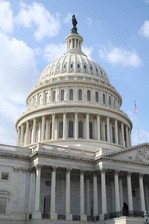Advocacy
USCA activities help remove federal barriers to produce canola and create incentives for producing more of it. These efforts include:

- Equalizing canola’s eligibility and benefits in farm programs
- Establishing and expanding crop insurance coverage for spring and winter canola
- Expanding the availability of crop protection products
- Increasing funding for canola agronomic and nutrition research
- Working closely with members of Congress from canola-producing states
- Meeting regularly with Congressional staff involved in agriculture
- Participating in agriculture-related hearings, sometimes with testimonials
- Submitting comments on canola-related policy initiatives and proposals
- Hosting an annual “Canola on Capitol Hill” reception for Congressional agricultural staff
Key legislative issues for the USCA are trade and tariffs, biofuels, seed oils, crop protection (both biotechnology and pesticides), crop insurance and appropriations for canola research among other timely issues. In addition, the USCA is actively involved in ongoing legislation that may affect canola crops or products, such as the farm bill and Dietary Guidelines for Americans. See policy priorities for 2025.
